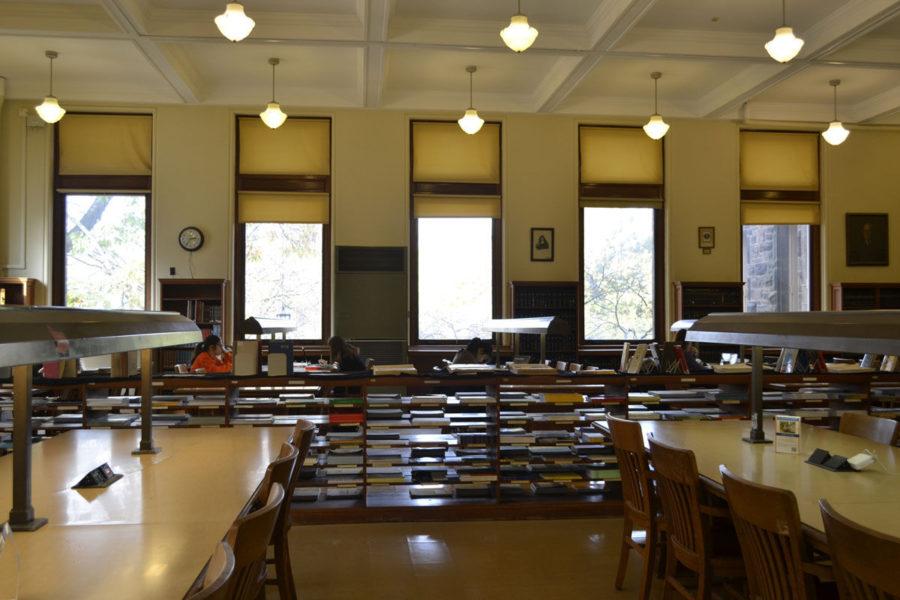Altgeld renovations aim for accessible, modernized updates
Nov 3, 2014
Last updated on May 11, 2016 at 12:26 a.m.
The deteriorating, green walls of Altgeld Hall remind Matt Ando, head of the mathematics department, of an old battleship. “The University can’t let this building fall apart,” he said. “It hasn’t fallen apart just yet, but Altgeld needs renovating if it’s going to stay standing.”
Ando and several colleagues presented a $90 million proposal to the University that aims to improve accessibility and modernize the building. In addition to added space, the renovations would add updated technology, such as projectors and screens, and add more collaboration-friendly learning spaces.
According to the proposal, space would increase for classrooms by 25 percent, research by 150 percent and Mathematics department offices by 20 percent.
He said the University is able to commit $30 million of its own resources, but it will need to be confident it can assemble the remaining, necessary funds before it moves forward with the project.
Get The Daily Illini in your inbox!
“Accommodating disabled students well is something the University is known for,” Ando said. “When you have a reputation for doing something well, that’s a powerful thing, but it’s also a responsibility and it’s not a reputation we would want to lose.”
He said he believes the University will risk failing that reputation if Altgeld is not renovated.
The building, which was added to The National Register of Historic Buildings, was originally constructed in 1897 to serve as the University’s library and administrative building. In 1927, Altgeld became home to the College of Law until 1956 when the Mathematics Department moved in. The math department has not left, nor has the building been systematically renovated, since then. The department has grown so much over the past 58 years that it now calls three other locations on campus home: Illini Hall, the basement of Coble Hall and the Oil Chemistry building.
“We had to ship some graduate students off to Siberia for this. Well at least Oil Chemistry sounds like Siberia,” Ando joked while on a tour of the building. Jokes aside, Ando believes the math department needs more space and hopes to gain it from the proposed renovations.
Currently, there are many classrooms on the Quad-side of the building that are not accessible to handicapped students, including the undergraduate advising office. The elevator does not reach two of the building’s five floors and is hard to find.
Susann Sears, acting director of Disability Resources and Educational Services, confirmed Altgeld’s inaccessibility has been an issue in the past. When the elevator broke one year, classes had to be moved to accommodate disabled students, and the relocation ended up creating an “avalanche effect.”
Sears hopes the University is mindful of ensuring that alternate locations are accessible during renovations. Additionally, she wants renovators to remember that adding accessibility doesn’t mean losing the building’s historic charm.
“Updated renovations can be aesthetically pleasing,” Sears said. “I think there is this myth when building accommodations for people in wheelchairs or with mobility disabilities, that it has to look strange or sterile, and that is just untrue.”
In addition to making Altgeld more accessible, the renovation would be aimed at also making the building more collaborative.
“Right now, our classrooms are most suitable for someone to stand up in front of the room and lecture,” Ando said. “And we really need spaces where students can meet and interact and collaborate on solving problems.”
Muhammad Yousuf, sophomore in LAS, had not heard about the proposed renovation, but agreed that more collaborative space would be welcomed. Yousuf takes Math 241 in Altgeld and said that the building seems “dilapidated.” Yousuf said he has always been impressed with the architecture, but it is not striking enough to distract him from Altgeld’s many flaws. He noted that there is sharp metal sticking out of old lecture chairs and that the windows don’t insulate classrooms well. Despite the building’s many flaws, Yousuf does appreciate Altgeld.
“I do like the main lecture hall, how it’s circular,” Yousuf said. “It is really conducive to learning, especially in a large lecture. It does really help the flow of the lecture.”
Ando said the renovations would encourage the flow of discussion in lectures and outside of class.
“We want to give them a cheerful space so students can say, ‘Let’s go to the lab now. That sounds like a fun place to work and relax.’” Ando said. “We don’t really have any space where students want to go.”
Ando said, if anything, the building’s library is the best place to work, but even that has it’s downfalls.
“It really feels to me like a classroom and a library for a university out of the 19th century, in the best sense of the word,” Ando said.
The renovation will bring the library back to its original architecture and restore the library’s glass dome ceiling. Ando said the dome leaked during World War II, but the University couldn’t afford to repair it, so instead just covered it up.
The renovation would leave the exterior of the building relatively unchanged because of its status on the National Register.
“People will get excited about taking a marvelous building like this, with all kinds of wonderful features, and helping it realize its potential,” Ando said.
Abigale can be reached at [email protected].






